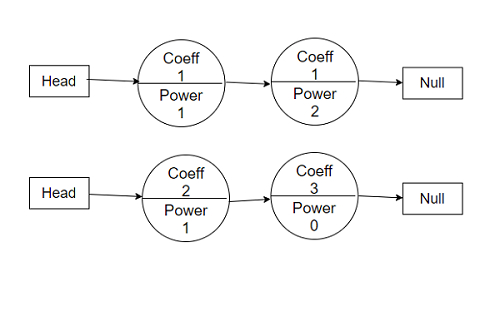
 Data Structure
Data Structure Networking
Networking RDBMS
RDBMS Operating System
Operating System Java
Java MS Excel
MS Excel iOS
iOS HTML
HTML CSS
CSS Android
Android Python
Python C Programming
C Programming C++
C++ C#
C# MongoDB
MongoDB MySQL
MySQL Javascript
Javascript PHP
PHP
- Selected Reading
- UPSC IAS Exams Notes
- Developer's Best Practices
- Questions and Answers
- Effective Resume Writing
- HR Interview Questions
- Computer Glossary
- Who is Who
Program to add two polynomials given as linked lists using Python
Suppose, we are given two polynomials and we have to find out the addition of the two polynomials. The polynomials have to be represented as linked lists; the terms of the polynomials will be represented as a linked list node. Each linked list node will contain the coefficient value, power value, and the pointer to the next linked list node. We have to return a third linked list which is the addition of two linked list polynomials.
So, if the input is like

1x^1 + 1x^2 = 0 and 2x^1 + 3x^0 = 0,
then the output will be 3x^1 + 1x^2 + 3x^0 = 0
To solve this, we will follow these steps −
dummy := a new polynomial node
node := a new polynomial node
-
while poly1 and poly2 is not empty, do
-
if power of poly1 > power of poly2, then
next of node := poly1
node := poly1
poly1 := next of poly1
-
otherwise when power of poly1 < power of poly2, then
next of node := poly2
node := poly2
poly2 := next of poly2
-
otherwise,
coef := coefficient of poly1 + coefficient of poly2
-
if coef is non-zero, then
poly1 := next of poly1
poly2 := next of poly2
-
next of node := poly1 or poly2
return next of dummy
Let us see the following implementation to get better understanding −
Example
class polynomial: def __init__(self, coeff = 0, pow = 0, nxt = None): self.coefficient = coeff self.power = pow self.next = nxt def create_poly(expression): head = None for element in expression: if head == None: head = polynomial(element[0], element[1]) else: temp = head while temp.next != None: temp = temp.next if temp.next == None: temp.next = polynomial(element[0], element[1]) return head def show_poly(head): temp = head while temp.next != None: print(str(temp.coefficient) + 'x^' + str(temp.power), end = ' + ') temp = temp.next if temp.next == None: print(str(temp.coefficient) + 'x^' + str(temp.power), end=' = 0') def solve(poly1, poly2): dummy = node = polynomial() while poly1 and poly2: if poly1.power > poly2.power: node.next = node = poly1 poly1 = poly1.next elif poly1.power < poly2.power: node.next = node = poly2 poly2 = poly2.next else: coef = poly1.coefficient + poly2.coefficient if coef: node.next = node = polynomial(coef, poly1.power) poly1 = poly1.next poly2 = poly2.next node.next = poly1 or poly2 return dummy.next poly1 = create_poly([[1,1], [1,2]]) poly2 = create_poly([[2,1], [3, 0]]) poly3 = solve(poly1, poly2) show_poly(poly3)
Input
poly1 = create_poly([[1,1], [1,2]]) poly2 = create_poly([[2,1], [3, 0]])
Output
3x^1 + 1x^2 + 3x^0 = 0

